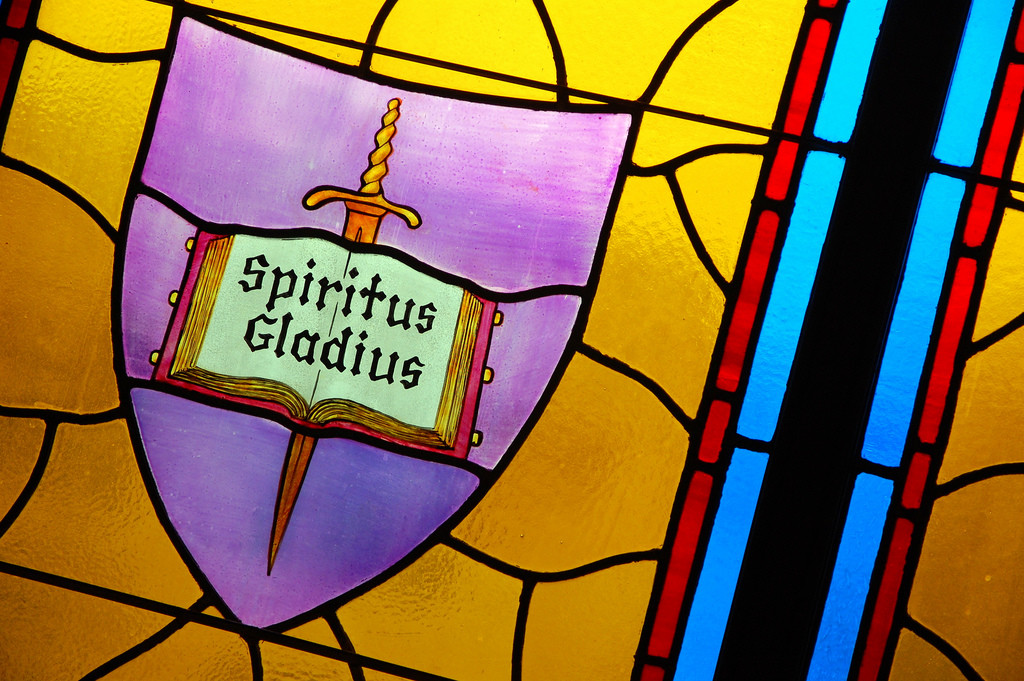As Catholics, we are typically characterized as not being too interested in Sacred Scripture. Even though we listen attentively to the Word of God every Sunday, very few of us allow the Bible to permeate our everyday lives. This is unfortunate as the inspired words of Scripture have such power that they can help conquer the spiritual foes that try to oppress us.
[featured-image single_newwindow=”false”]Steve Snodgrass – Flickr[/featured-image]
A simple reading of the Gospels helps us see that Jesus Himself used the “Sword of the Spirit” to battle against the temptations of the devil:
“Then Jesus was led by the spirit into the desert, to be tempted by the devil.
And when he had fasted forty days and forty nights, afterwards he was hungry.
And the tempter coming said to him: If thou be the Son of God, command that these stones be made bread.
Who answered and said: It is written, Not in bread alone doth man live, but in every word that proceedeth from the mouth of God.
Then the devil took him up into the holy city, and set him upon the pinnacle of the temple,
And said to him: If thou be the Son of God, cast thyself down, for it is written: That he hath given his angels charge over thee, and in their hands shall they bear thee up, lest perhaps thou dash thy foot against a stone.
Jesus said to him: It is written again: Thou shalt not tempt the Lord thy God.
Again the devil took him up into a very high mountain, and shewed him all the kingdoms of the world, and the glory of them,
And said to him: All these will I give thee, if falling down thou wilt adore me.
Then Jesus saith to him: Begone, Satan: for it is written, The Lord thy God shalt thou adore, and him only shalt thou serve.
Then the devil left him.” (Matthew 4:1-11, emphasis added)
Even though Satan tried to twist Scripture to his own advantage, Jesus answered back with the proper interpretation that defeated each temptation. This is important, for it shows to us that Scripture is a mighty spiritual weapon against the lies of the Evil One.
Saint Paul affirms the power of Scripture in his two most famous passages regarding this topic:
“And take unto you…the sword of the Spirit (which is the word of God).” (Ephesians 6:17)
“For the word of God is living and effectual, and more piercing than any two edged sword.” (Hebrews 4:12)
But how does one use Scripture properly? Just like a real sword, a person must be trained in its proper use. Wielding a sword is an art-form; so too is wielding Sacred Scripture.
Over the next several weeks, I will be featuring a mini-series on this important topic. We typically are ready and willing to use certain spiritual weapons like sacramentals, but we fail to realize the power behind the Bible.
Foundational Principles: The Bible is Inspired by God and Without Error
To start off, we must affirm that the Canon of Scripture is inspired by God and without error. What this means is that God is the primary author of the numerous books of the Bible. As the Catechism states,
105 God is the author of Sacred Scripture. “The divinely revealed realities, which are contained and presented in the text of Sacred Scripture, have been written down under the inspiration of the Holy Spirit.”
“For Holy Mother Church, relying on the faith of the apostolic age, accepts as sacred and canonical the books of the Old and the New Testaments, whole and entire, with all their parts, on the grounds that, written under the inspiration of the Holy Spirit, they have God as their author, and have been handed on as such to the Church herself.”
While the various books included in the Canon of Scripture were physically written by a secondary human author (we will cover this topic next week), the primary author is God. This affects our approach to Scripture entirely, for it means that everything, “whole and entire, with all their parts,” is divinely inspired.
It naturally follows that because the Bible has God as its author, it can not contain error. Often when we read Scripture we think that we found some sort of inconsistency or that something within a particular book couldn’t be true. We think to ourselves that the author made some sort of mistake. However, that is not what we believe as Catholics. We believe there is no error in Scripture.
In the Papal Document Providentissimus Deus, we see a perfect summation of this concept:
“The words of St. Augustine to St. Jerome may sum up what they taught: ‘On my part I confess to your charity that it is only to those Books of Scripture which are now called canonical that I have learned to pay such honour and reverence as to believe most firmly that none of their writers has fallen into any error. And if in these Books I meet anything which seems contrary to truth, I shall not hesitate to conclude either that the text is faulty, or that the translator has not expressed the meaning of the passage, or that I myself do not understand.'” (Providentissimus Deus, 21, emphasis added)
This should give us a vital key in our reading of Scripture. When we come across a passage where we think we have found an error, we should remind ourselves that either the translation is faulty or that we are faulty in our understanding. God is not the one who made the mistake.
Going forward, this will help is in wielding the “Sword of the Spirit,” for we can have absolute confidence that God meant what He said in Sacred Scripture. They key, however, is that we need to understand the intent of each book in the Bible.
Read the Entire Series

